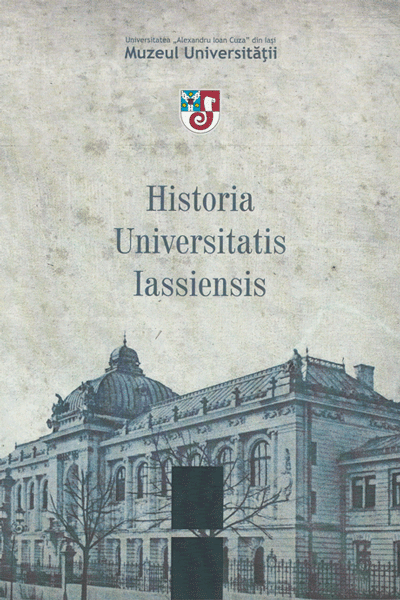Începutul Primului Război Mondial și efectele sale asupra vieții universitare clujene. Mărturia rectorului Márki Sándor
The beginning of the First World War and its effects on the Kolozsvár/Cluj University life. The testimony of Rector Márki Sándor
Author(s): László WellmannSubject(s): History, Local History / Microhistory, Recent History (1900 till today), Interwar Period (1920 - 1939)
Published by: Editura Universităţii »Alexandru Ioan Cuza« din Iaşi
Keywords: First World War; universities in Austro-Hungary; University of Kolozsvár/Cluj; academic life; Rector Márki Sándor;
Summary/Abstract: The article analyzes the daily life at the “Francis Joseph” University of Kolozsvár/Cluj in the academic year 1914-1915, at the start of the First World War. Based predominantly on the annual report and other documents written by Professor Márki Sándor, the rector of the university at the time, our study reveals the extent of the war's impact upon the teaching process, as well as other administrative or financial difficulties encountered by the academic staff and the students who continued to attend the courses. In the first few months following the outburst of the war various initiatives in favor of those fighting on the military theatres appeared in the academic world of Kolozsvár/Cluj. For example, by means of posters glued to the walls of the University, Rector Márki urged the students to volunteer for training as officers in special military schools. The appeal had a good echo: by 26 October, 132 young people had already shown interest in enrolling, being registered on the lists of records made for this purpose. The deadline for inclusion on these lists was then extended until 15 November 1914. The rector even wished that such a school would be created in the city of Kolozsvár/Cluj, but he was unsuccessful. Another interesting idea that was implemented at the university was to collect money for the Transylvanian families whose members were sent to the front. Through volunteer donations, the efforts of the academic staff managed to raise the impressive sum of 14,722 crowns in the academic year 1914-1915. The university was also directly affected by the war and was faced with numerous hardships. Thus, the article describes in detail which academic buildings were used for the war effort, namely for hospitals or for the accommodation of the army troops, instead of hosting teaching and research activities. For example, from December 1914 to July 1915, a number of 5,390 wounded and sick soldiers were cared for in the Kolozsvár/Cluj University Hospitals and at the Pasteur Academic Institute. Out of these, 2,233 soldiers were healed, 1975 were partially healed and transferred to other hospitals, and 126 of them died. Meanwhile, the clinics equally provided medical care to the local civilian population, treating almost four thousand people. Last but not least, this article pays special attention to the way the professors and the students regarded the evolution of the war. On the one hand, the military events highlighted the need for academic reforms, more precisely for adapting the institution to the new social and political conditions. On the other, the war offered many opportunities for the academics, and in particular for rector Márki Sándor, to discuss or reflect upon the best collective attitudes people must adopt during those hard times. Consequently, this research offers new and interesting perspectives regarding the university life during the Great War, opening the possibility of/paving the way for further comparative studies in this field. In total, a number of 2,236 people from the University of Kolozsvár/Cluj directly parti¬cipated in the war in 1914-1915, namely 40 teachers, 1726 students, 340 physicians and 170 technical employees, and 105 of those who enlisted died on the battlefield. It was a great human toll paid by this prestigious Transylvanian institution, a toll that would only rise in the following years of the war, as Austro-Hungary and the other Central Powers were progressively defeated by the Entente.
Journal: Historia Universitatis Iassiensis
- Issue Year: 2016
- Issue No: 07
- Page Range: 6-28
- Page Count: 20
- Language: Romanian

